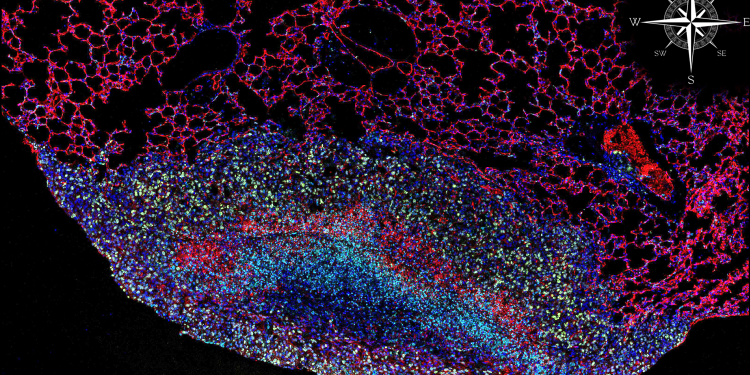eDyNAmiC
Meet eDyNAmiC, whose challenge is to understand the biology of ecDNA generation and action, and develop approaches to target these mechanisms in cancer.

Currently viewing section: About
Date: 1 - 3 September 2026
Location: The Royal Society, 6-9 Carlton House Terrace, London SW1Y 5AG UK
This landmark conference will bring together global leaders in cancer research, technology development and clinical practice to explore the frontiers of spatial biology. As a rapidly evolving field, discover how cutting-edge tools and collaborative science are unlocking new insights into cancer and how they can shape the future of patient care.
In 2015 Cancer Grand Challenges set the 3D tumour mapping challenge and funded teams IMAXT and Rosetta. In 2024 a further investment of £5.25M from CRUK was provided to members of IMAXT to set up the Spatial Profiling and Annotation Centre of Excellence (SPACE).
Based at the University of Cambridge and led by Professor Greg Hannon, along with Dr Nicholas Walton and Dr Dario Bressan, SPACE will democratise IMAXT’s cutting-edge spatial biology platform and foster collaborations across the research community. By enabling scientists worldwide to explore tumours in 3D, SPACE is advancing our understanding of cancer's complexity within its spatial context.
Registration will open on Monday 5 January and will close on Monday 13 July 2026. If you’re interested in attending, please email events@cancergrandchallenges.org to join the mailing list.
Registration includes VAT, a light breakfast, networking lunch and coffee breaks on all days, and a welcome reception on Tuesday 1 September. See fees below:
| Student/PhD/Postdoc | £150 |
| Academic/Clinical | £300 |
| Industry | £500 |
Please note that the above prices to not include Eventbrite fees (6.95%, 59p, plus VAT).
Abstract submissions
Abstract submissions will open on Monday 5 January along with registration and close on Friday 15 May 2026. There will be many opportunities for selected talks and poster presentations.
Abstract evaluation will start after the deadline and may take up to four weeks to complete depending on the number of submissions we receive. Acceptance notifications will go out via email before the end of June 2026. We appreciate your patience. Please note that it is not required to submit an abstract to attend the conference.
The field of spatial biology is at an inflection point, thanks to rapid advancements in AI-driven analysis and multi-omics integration. Emerging tools and technologies have allowed spatial mapping of tumour tissues, providing unprecedented insights into tumour heterogeneity, revealing complex cellular interactions within the microenvironment, enabling researchers to map cancer progression and resistance in three dimensions.
By addressing key challenges, such as the sheer volume of data being generated as well as the integration of vastly different approaches, spatial biology is now poised to move even further away from descriptive studies towards addressing important translational questions by becoming integrated in the clinic. Potential applications range from identifying predictive biomarkers and understanding treatment resistance mechanisms to informing precision medicine strategies.
Topics will include:
This conference is being organised by a dedicated steering committee, chaired by: Professor Greg Hannon.
Meet the committee members below.
Attendees wishing to cancel their place can receive a full refund up to 30 working days before the event start date. All cancellations must be made in writing to events@cancergrandchallenges.org by 21st July 2026. Any cancellations received after this date will not be refunded. Attendees can send a replacement free of charge.
Cancer Grand Challenges is co-founded and operationally delivered by Cancer Research UK (CRUK). The refund policy, code of conduct and guiding principles will be implemented at all CRUK events delivered by Cancer Grand Challenges. Cancer Research UK is not liable for any travel or accommodation costs relating to attendee bookings.
The conference will be held at The Royal Society, located at 6-9 Carlton House Terrace, London SW1Y 5AG. Please see venue and transport link information below:
Detailed directions from the venue website
Stations Charing Cross (underground and national rail) and Piccadilly Circus (underground) are both a 7 – 10 minute walk
For travel to London by rail or DLR, consult National Rail Enquiries
For travel within London, including from airports, consult Transport for London Journey Planner
We advise travelling by public transport, but should you wish to drive, use directions to The Royal Society. The venue is located within the congestion charge zone. On-street parking on Carlton House Terrace and Waterloo Place is available for up to four hours, for £3.30 - £4.40 per hour. Westminster City Council's Trafalgar Square car park is also near by.
The Royal Society is in a central London location with many hotels near by. See below a few suggestions; we strongly recommend booking early to secure a good rate:
Please take a moment to familiarise yourself with the important information below regarding how we run our events: